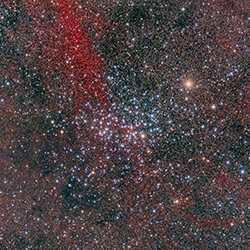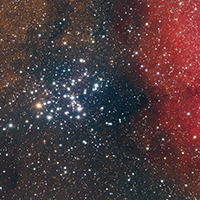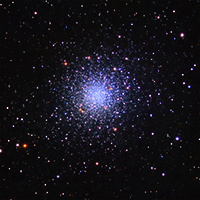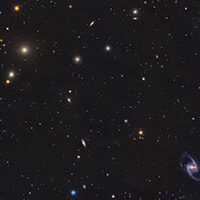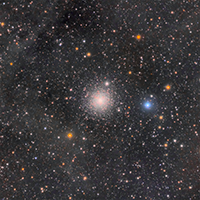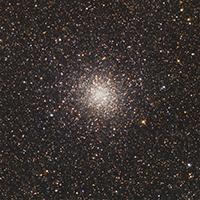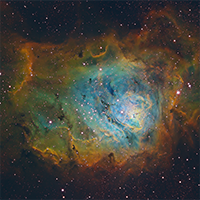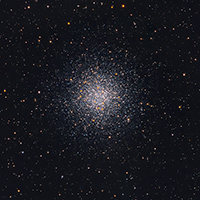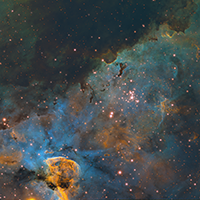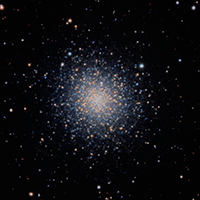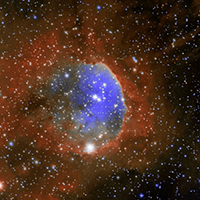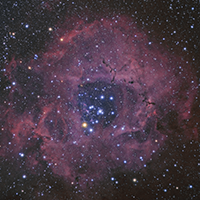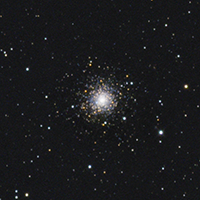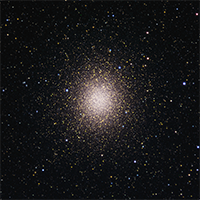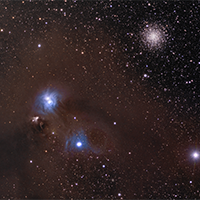Tagged: Cluster
16-Jun-2022
First Calalogued in 1752, the NGC 3532, also known as the Wishing Well Cluster is an open cluster comprised of approximately 150 stars. It was also the first object ever observed by the Hubble Space Telescope. The bright orange star in the top right of the image is x Carinae (x Car), the brightest yellow hypergiant in the sky - 200,000 times as luminous as the Sun.
07-Jul-2019
The Butterfly Cluster, Messier 6, is an open cluster of hot blue stars with the brightest member being an orange giant star. Behind the cluster is the orange light of the Milky Way, and a beautiful cloud of excited Hydrogen alpha gas.
04-Jul-2020
M68 is a globular cluster at a distance of about 33,000 light-years away from Earth.
18-May-2020
The Fornax Cluster is a cluster of 58 galaxies centered around 62 million light years distant.
13-Oct-2019
Messier 15 is a very old and tightly packed home to over 100,000 stars. It is 33,600 light years from Earth, and is visible to the naked eye in areas with little light pollution.
10-Sep-2019
10600 light years away, Messier 22 is one of the closest and brightest globular clusters visible from Earth.
27-Aug-2019
The Lagoon Nebula is an active stellar nursery spanning 60 light years across. This false color photograph shows the interplay of three gasses: hydrogen-alpha in green, sulfur-II in red, and oxygen-III in blue.
13-Aug-2019
One of the few Messier objects difficult to observe in the northern hemisphere, M55 is a globular cluster 17,600 light years away, comprising of around 100,000 very old stars.
19-Apr-2019
One of the largest nebulae in the sky, the Carina Nebula is visible to the naked eye in the southern sky.
26-Sep-2018
55,000 light years away, Messier 2 (M2) is one of the largest known globular clusters.
13-Mar-2018
The Gabriela Mistral Nebula lies close to the Carina Nebula ~7500 light years distant in the far-southern sky. This image is a narrowband representation showing glowing ionised gasses, Hydrogen-alpha (orange), Sulfur-II (red), and Oxygen-III (blue).
21-Jan-2018
The Rosette Nebula is an emission nebula 3000 light years away. The central area of the nebula contains an open cluster of hot, blue stars which have cleared much of the center of its gas.
11-Sep-2017
Messier 75 is a dense globular cluster 65000 light years away. This test shot is the first published photo from my new 10" f/4 newtonian telescope, and it's been quite a journey to get a nice field corrected image from it. Now I wait for the new moon and a suitable target.
19-Apr-2017
Omega Centauri (NGC 5139) is the largest globular cluster in the Milky Way at a diameter of roughly 150 light-years. It is estimated to contain approximately 10 million stars.
26-Jun-2016
Less than 500 light-years away and blocking light from more distant, background stars in the Milky Way, the densest part of the dust cloud of Caldwell 68 is about 8 light-years long. At its tip is a group of reflection nebulae cataloged as NGC 6726, 6727, 6729, and IC 4812. A characteristic blue color is produced as light from hot stars is reflected by the cosmic dust.
